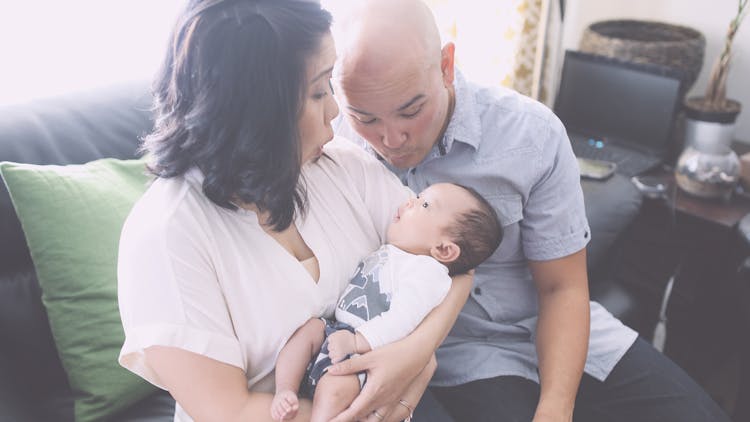When my husband died suddenly after almost 15 years of marriage, I found myself a widow at the age of 34. Every day after felt like I was walking in a fog of sorrow and grief. Every nerve, feeling, emotion, and fear rose up like a thick cloud that consumed me. But, over time, I made it through the fog by remembering that, even when life is hard, I can still trust that God is in control.
The truth is, we don’t know what the future holds, but when we give our lives to God, He can be trusted with our future. Regardless of how difficult it feels or how many struggles we face, we can still trust Him to bring about good in our lives. As I grieved, I was reminded that despite my present pain, God promises us a bright new future (2 Corinthians 4:6-9). I was also reminded of these verses:
For I know the thoughts that I think toward you, says the Lᴏʀᴅ, thoughts of peace and not of evil, to give you a future and a hope. Then you will call upon Me and go and pray to Me, and I will listen to you. And you will seek Me and find Me, when you search for Me with all your heart. Jeremiah 29:11-13 NKJV
What strikes me about that passage is not just that God promised good plans for the people of Israel but that those plans came right after hearing they would be exiles in a foreign land for 70 years. When life gets hard, God isn’t absent. He’s with us, guiding us toward His good purposes.
God’s promises are not canceled by our crises. Miracles are a part of His plan. When life gets hard, we can often feel imprisoned by our circumstances and our choices. In this current season of uncertainty, we may feel helpless and overwhelmed. But we still have the same access to God’s mercy, grace, power, and presence.
After my husband died, I still woke up every morning. I didn’t want to—I just did. It felt as though someone had reached into my body and ripped out half of my heart. I allowed the tragedy to blind me to hope, faith, and, most of all, remembering God’s faithfulness in the past.
But just because a situation is difficult doesn’t mean we’re not where we’re supposed to be. We may feel abandoned or separated from God, but we should never give up seeking Him and living out His plans for us. I’m reminded of Moses, who didn’t give up and who trusted God to deliver him—no matter how dark his past or how dismal his future seemed.
In Exodus 2:11-25, Moses tried to cover up his killing of an Egyptian. When that didn’t work, to escape punishment, Moses ran away to the land of Midian—separated from his home and family. He worked there as a shepherd, and it took many years after this event for Moses to be ready to serve God. But God was always with him and always preparing a way.
God was preparing Moses for leadership. By living as a shepherd, he learned the ways of the people he would be leading and about life in the wilderness. Moses didn’t see it in the moment, but the Lord was preparing him to free Israel.
When life gets hard and you can’t imagine how God will use a situation for your good and His glory, just think of Moses. God may be taking you through a desert to bring you to a mountaintop. What first looks like the end may really be the beginning of God’s new chapter in your life. It’s hard to see—even more difficult to believe—but God can use tragedy for His purpose. Looking back, God was preparing me for my calling to help women rebuild their lives after tragedy and trauma. God never wastes a hurt.
In the middle of our pain or uncertainty, we’re often tempted to try to control the situation. Don’t fall for that. Pray for guidance, then surrender control to the only One who can handle it (See Isaiah 26:3 and Isaiah 30:15). Never forget that God cares for you, and God loves you. We all experience troubles and trials, but there is always a light in the darkness.
Maybe you’re in the thick of unimaginable pain, or maybe the uncertainty of this season has you shaken and discouraged. In times like these, we’re often tempted to ask why. We want to understand the purpose of our pain. But Scripture reminds us to “not depend on your own understanding” (Proverbs 3:5-6). We may not always know why, but we can always trust God. He knows what is best for us. He wraps His arms around us and reveals Himself as the God who comforts and carries us when we have no strength left to go on.
Can I trust Him with all the things that make no sense to me? Yes. And it is a daily, hour-by-hour, minute-by-minute choice to trust God. I must be willing to put all moments, good and bad, into the hand of God, because His ways are perfect! I don’t have to understand my pain to be guided by God’s purpose.
When life gets hard, we can come to Jesus just as we are. We can come brokenhearted. We can come full of shame. We can come full of anger, pain, and hopelessness, just as it reminds us in Scripture:
So let us come boldly to the throne of our gracious God. There we will receive his mercy, and we will find grace to help us when we need it most. Hebrews 4:16 NLT
To come boldly, we must first trust God enough to call on His name and ask Him for help. We need to offer our fear, worry, and even our planning to God as we pray.
As we pray, it isn’t easy to wait on God. Trust me, I have struggled to wait for God when it appeared that He was silent. And although He might have felt silent to me, He was always working. When I trusted and let go, I was able to look back and see that I was growing in Him, even when it felt like nothing was changing.
When life gets hard, don’t stop praying. We can know with confidence that we can be more than conquerors through Him. We conquer not because of what we feel or what we experience but because of who God is and where He is. He is always with us!
If we choose to trust Him, even during our trials, God will see us through the valley. The more we trust Him, the more we will experience Him, and the more we experience Him, the more others will see Him.
So, when life gets hard, remember that God pours His strength into us during our storms. He shelters us with His love, compassion, and mercy. He conquers our storms with His love, hope, and faithfulness. He is working behind the scenes, through many hearts and lives, to strengthen us and bring us through the storm.


